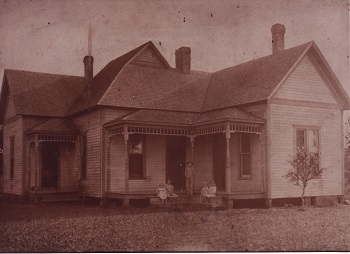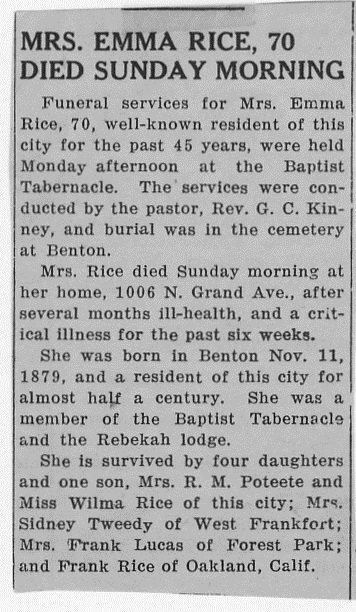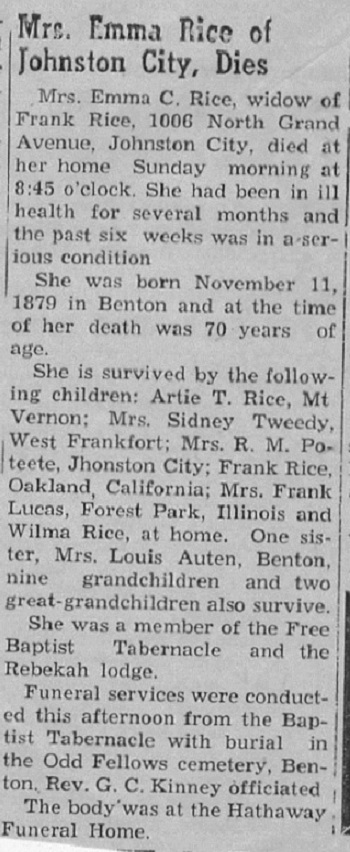
Emma Caroline WESTON was born 11 Nov 1879 near Benton in Franklin County, Illinois, to Hiram and Laura Ann Ellers (SKEEN) WESTON.
"She was the youngest girl in a family of six children. She attended a one-room country school through the equivalent of the Sixth Grade. Since there were four older girls to do the household chores, Emma helped 'in the field' quite a bit as a child." [*FHA]
"On 17 Sep 1893, when she was 17 years old, Emma married William Franklin RICE." [*FHA]
Frank and Emma had eight children: Chester Paul (1894), Barney Tilbert (1895), Artie Tecumseh (1898), Beulah Gertrude (1900), Emma Mae (1903), Harry Franklin (1905), Verbal Marie (1908), and Wilma Lorene (1913).
"Their first child, Chester Paul, died when he was six and a half months old. A few years after their marriage, she and their two small ones, Barney and Artie, went with her husband to Missouri where he was employed cutting railroad ties. Although their two sons were quite small, it was necessary to leave them at home alone parts of some days in order that Emma could assist her husband with some phase of the work with the lumber." [*FHA]
"The house they lived in was made of logs and consisted of one room, heated by wood in a pot-bellied stove. The floor was made from the split side of the logs which was rough and not very weather-proof. Since she could not afford to spend any money to improve the house, Emma sewed together burlap bags (then called tow-sacks) and made a rug for the floor. She dyed this rug with poke berry juice." [*FHA]
"They did not remain in Missouri much more than a year, but returned to Benton where the next two daughters were born." [*FHA]
"In 1902, they moved to Johnston City, Williamson County, Illinois, to a house on Missionary Street. There were no numbers on the houses at that time; people went to the post office for their mail. This house had a large lawn, in those days called a 'yard,' where all the neighborhood children congregated to play. There was a street light in front of the house where they could play in the evenings." [*FHA]
"Frank and Emma belonged to a social club consisting of couples of like interests; small children, etc.. This club have her a silver thimble with a gold band which was very much a part of the household for the rest of her life. She made almost all of the children’s clothes, even coats and suits for the boys. At Easter time, all of the children had a new outfit to wear to Sunday School. She would begin sewing weeks in advance in order that each child could be as well dressed as his friends. To supplement the income, she sewed for other people for many years. As she sewed she entertained her children by singing all the old songs she knew and reciting poetry. She memorized poems for this purpose and to keep her mind agile. She loved to read and encouraged her children to read also -- always insisting on good literature." [*FHA]
"In early 1914, World War I broke out. Barney enlisted in the Navy. Artie joined the Army in 1917. In 1923 the youngest son, Harry, joined the Navy." [*FHA]
 "Also
in 1914, the family purchased a house on Holland Street. In later
years this street became the State Highway through Illinois. When they moved
there, the street was narrow and unpaved, with deep ditches on either side.
The house had a large L-shaped front porch and smaller porches on both sides
of the house in back. The front lawn was lined with large maple trees, an
elm, and a sassafras tree which provided welcome shade in the hot summer
weather. There was a Concord grape arbor and cherry, red plum, and apple
trees. The drinking water came from a deep well on one side of the house,
and there was a cistern for 'soft' water on the opposite side of the house.
A small shed, always referred to as 'the woodhouse' was located a few yards
behind the house, and held the overflow of old school books, old clothing,
etc.. The house was heated in winter with a coal-burning stove, and the
cooking was done on a coal cookstove. One of the back porches was made of
cement and because it was cooler there in summer, many of the household
activities were centered there, such as preparing food for canning, etc..
The family washing was also done there in warm weather, with a hand-operated
washing machine that the children took turns turning, then Emma would rub
the clothes on a metal 'wash board.' She made a large porch swing out of an
old bedstead and this hung on the front porch and was in almost constant use
during hot weather. There was a large barn on the back of the property where
chickens were kept, and with a loft where the children and their friends
could play 'house,' swing from trapezes, or just visit. In the chicken yard,
Frank constructed a 'flying jenny,' a sort of marry-go-round, which
attracted all the neighborhood children." [*FHA]
"Also
in 1914, the family purchased a house on Holland Street. In later
years this street became the State Highway through Illinois. When they moved
there, the street was narrow and unpaved, with deep ditches on either side.
The house had a large L-shaped front porch and smaller porches on both sides
of the house in back. The front lawn was lined with large maple trees, an
elm, and a sassafras tree which provided welcome shade in the hot summer
weather. There was a Concord grape arbor and cherry, red plum, and apple
trees. The drinking water came from a deep well on one side of the house,
and there was a cistern for 'soft' water on the opposite side of the house.
A small shed, always referred to as 'the woodhouse' was located a few yards
behind the house, and held the overflow of old school books, old clothing,
etc.. The house was heated in winter with a coal-burning stove, and the
cooking was done on a coal cookstove. One of the back porches was made of
cement and because it was cooler there in summer, many of the household
activities were centered there, such as preparing food for canning, etc..
The family washing was also done there in warm weather, with a hand-operated
washing machine that the children took turns turning, then Emma would rub
the clothes on a metal 'wash board.' She made a large porch swing out of an
old bedstead and this hung on the front porch and was in almost constant use
during hot weather. There was a large barn on the back of the property where
chickens were kept, and with a loft where the children and their friends
could play 'house,' swing from trapezes, or just visit. In the chicken yard,
Frank constructed a 'flying jenny,' a sort of marry-go-round, which
attracted all the neighborhood children." [*FHA]
"On hot summer evenings, Emma would accompany her own children, and any others who might want to go, out to a large mine pond so that they could swim. She and the other parents would sit on the bank to admonish protests when someone went out into deep water or the water fights became too boisterous." [*FHA]
"Holidays were always marked by something special. At Christmas, even if there was no money for new toys and gifts, there was always something to make Christmas special, such as a new wardrobe for an old beloved doll -- and somehow some candy, an orange, and nuts in the Christmas stocking. At Easter, there was always a 'nest' with colored eggs. On the Fourth of July, the family and sometimes neighbors would congregate on the front porch to celebrate with the fire works." [*FHA]
"In about 1920, Emma and Frank separated. Each succeeding year became more difficult financially, partly because she was not trained in any particular work and also because employment in the small town was very limited. Since al but the two youngest children were gone from the home by this time, either married or in the Service, Emma took in boarders to help with expenses." [*FHA]
"In April 1929, at the beginning of the Depression, Emma and her youngest daughter, Verbal Marie, went to Maywood, a suburb of Chicago, where both of them worked in a factory. This was very hard work, especially since Emma was 53 years old by this time. They returned to the family home in Sep 1929 so Verbal could finish high school. The balance of the depression years were full of hard work. She cooked in a restaurant, worked in a rooming house, cooking, cleaning, washing, ironing, waiting tables, and washing dishes -- all for a dollar a day." [*FHA]
1930 Census
1931 Daughters & Mother
Emma, Verbal, Wilma,
Beulah, Emma
1940 Census
"In 1935 for five months, she again went to Maywood and worked as a maid in a home. During the WWII years, Emma sewed in the community sewing room and during one interval was sent out to do housework and care for children in various needy homes. She also served a hot lunch to school teachers (the school was only one block from her home). She furnished the food, prepared it, served it, and washed the dishes -- for 35 cents a person. This endeavor supplied just enough cash to keep the electric bill paid." [*FHA]
"In 1939 Emma was able to stop working outside the home -- but she never ran out of things to do. She painted and varnished furniture and floors, reupholstered furniture, hung wallpaper, hooked rugs, embroidered, crocheted, tended her flower and vegetable garden, and kept chickens. Through necessity, she was her own carpenter. She built in part of a back porch to make a small sleeping room close to the heat in winter. She later built the remaining portion of this back porch into a bathroom, even so far as installing the window." [*FHA]
"Emma belonged to the Rebecca Lodge for many years and held all the offices 'through the chairs.' She worked diligently on all the fundraising projects required to keep the lodge active." [*FHA]
"Emma attended the Baptist Church for many years and for the last twelve years of her life she was a member of the Baptist Tabernacle Church." [*FHA]
"She was blessed with excellent health all of her life until her terminal illness of cancer. During the eight or nine months that she gradually failed, she forced herself to continue mending, crocheting, and reading. To the end she remained a courageous woman. She passed away Sunday morning 04 May 1947." [*FHA]


Blk. C, Lot 14, Sp. 7
Inter. No. 6059
Masonic &
Oddfellows Cemetery
Benton, Franklin County, Illinois
[*FHA Family History April 1964 probably written by Janet Banwart]
Many of the pictures displayed are small versions.
Simply click on the image to see an enlargement.
Our thanks to Marsha Bryant for graciously hosting this HASS Family History website on her server.